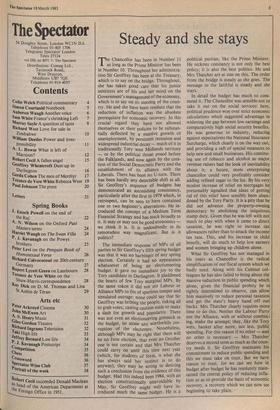Steady and she stays
The Chancellor has been in Number 11 as long as the Prime Minister has been in Number 10. Throughout her administra- tion Sir Geoffrey has been at the Treasury, which is to say on the bridge. Throughout, she has taken good care that his junior ministers are of his and her mind on the Government's management of the economy, which is to say on its steering of the coun- try. He and she have been resolute that the reduction of inflation was the absolute prerequisite for economic recovery. In this crucial regard they have not allowed themselves or their policies to be substan- tially deflected by a massive growth of unemployment, by persistent recession and widespread industrial decay — much of it in traditionally Tory west Midlands territory — or by the political threat posed before the Falklands, and now again by the crea- tion of the Social Democratic Party and the establishment of its alliance with the Liberals. There has been no U-turn. There has been hardly any detectable shift at all. Sir Geoffrey's sequence of budgets has demonstrated an astonishing consistency, particularly after the first in 1979 which, in retrospect, can be seen to have contained one or two beginner's aberrations. He in- troduced the concept of a Medium Te-rm Financial Strategy and has stuck broadly to it. It may or may not be good economics we think it is. It is Undoubtedly in its
politics? remorseless way magnificent. But is it The immediate response of MPs of all parties to Sir Geoffrey's fifth spring budget was that it was no harbinger of any spring election. Certainly it had no appearance whatsoever of being an electioneering budget. It gave no immediate joy to the Tory candidate in Darlington. It gladdened the hearts of few Tory marginal MPs. By the same token it did not stir Labour or Alliance MPs to fits of spurious temper and simulated outrage: none could say that Sir Geoffrey was bribing the people, risking all
caution aside to make a dash for growth and popularity. There to grab votes, casting was not even an electioneering gimmick in the budget, let alone any worthwhile cor- ruption of the electorate. Nonetheless, although MPs may be right that there will be no June election, that even an October one is not certain and that Mrs Thatcher could carry on until this time next year (which, for students of form, is what she has always said her instinct is to do anyway), they may be wrong in deriving such a conclusion from the evidence of this budget. Had this indeed been 1984, with an election constitutionally unavoidable by May, Sir Geoffrey might well have in- troduced much the same budget. He is a
political puritan, like the Prime Minister. He reckons constancy is not only the best policy; it is also the best politics. He and Mrs Thatcher are at one on this. The order from the bridge is steady as she goes. The message to the faithful is steady and she stays.
In detail the budget has much to com- mend it. The Chancellor was sensible not to take it out on the social services: here, political prudence won over strict economic calculations which suggested advantage in widening the gap between low earnings and comparatively high social security benefits. He was generous to industry, reducing against expectations the National Insurance Surcharge, which clearly is on the way out, and providing a raft of special measures to help new and small businesses. His continu- ing use of tobacco and alcohol as major, revenue raisers had the look of inevitability about it; a future, more enterprising chancellor could very profitably consider adding refined sugar to the list. By his very modest increase of relief on mortgages he presumably signalled that ideas of getting rid of this relief have sensibly been aban- doned by the Tory Party. It is a pity that he did not advance the property-owning democracy by abolishing the iniquitous, stamp duty. Given that he was left with not; much to play with when it came to direct; taxation, he was right to increase rather than to attack the income) tax tax rate. This, and his increase in child, benefit, will do much to help low earners and women bringing up children alone.
What Sir Geoffrey has not managed in his years as Chancellor is the radical simplification of our fiscal system which we badly need. Along with his Cabinet col- leagues he has also failed to bring about the massive reduction in public spending which, alone, given the financial probity he is rightly determined to observe, can allow him massively to reduce personal taxation and get the state's heavy hand off our backs. Mrs Thatcher clearly requires more' time to do this. Neither the Labour Party nor the Alliance, with or without combin- ing, make the attempt; they, like the Tory wets, hanker after more, not less, public spending. For this reason if no other — and no other is necessary — Mrs Thatcher. deserves a second term as much as the coun- try needs it. Sir Geoffrey maintains his commitment to reduce public spending and this we must take on trust. But we have, reason to trust, for we can see how in budget after budget he has resolutely main- tained the central policy of reducing infla- tion so as to provide the basis of economic recovery, a recovery which we can now see, beginning to take place.










































 Previous page
Previous page